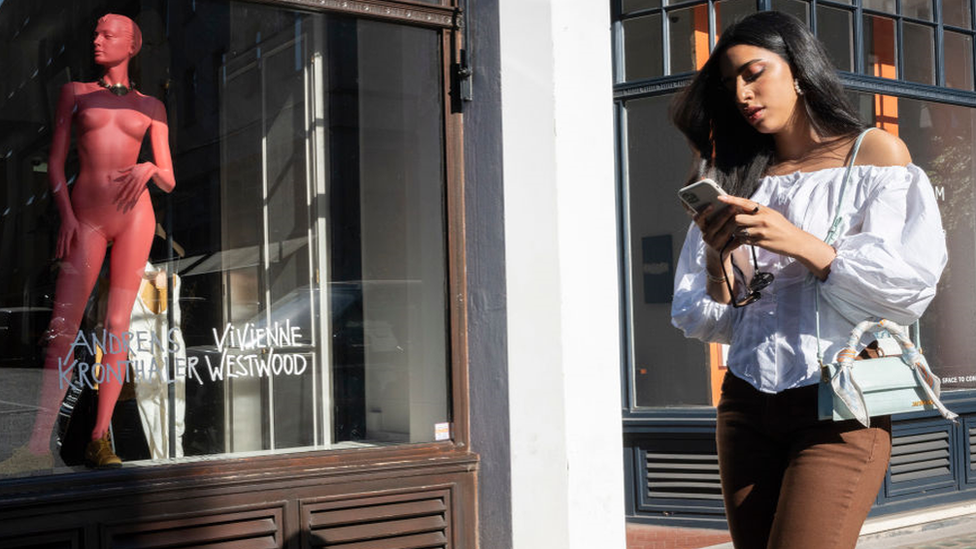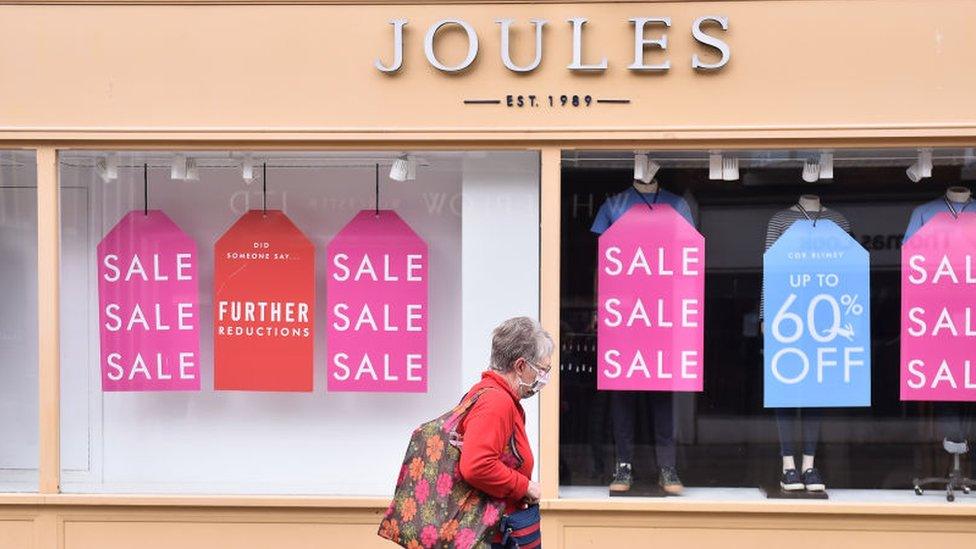Consumer confidence hits record low as prices soar
- Published
- comments

UK consumer confidence in the future hit a record low in August due to the soaring cost-of-living and bleak economic prospects.
A "sense of exasperation" about the economy was the biggest driver behind the fall, according to GfK's Consumer Confidence index.
Recent data showed that prices rose at the fastest pace 40 years in July and the UK is heading for recession.
Meanwhile, retail sales volumes fell by 1.2% in the three months to July.
The Office for National Statistics (ONS) said people were continuing to cut back on non-essential spending, in particular clothing and household goods.
Rachel Barber, legal partner and retail specialist at accountancy firm Deloitte said that because people are pessimistic about the state of the economy, many people "are now postponing major purchases such as electricals and furniture".
Fuel sales also declined in July as people cut down on travel, deterred by petrol and diesel prices as well as the recent hot weather.
Sales volumes nudged up slightly in July, by 0.3%, after a small fall in June, but overall figures show sales have been on a downward trend since summer 2021.
However, overall retail sales were still above pre-Covid levels, the ONS said.
The GfK consumer confidence barometer, which surveys the public about their opinion of the economy, was at its the lowest level this month since records began in 1974.
"These findings point to a sense of capitulation, of financial events moving far beyond the control of ordinary people", said Joe Staton, GfK's client strategy director.
"With headline after headline revealing record inflation eroding household buying power, the strain on the personal finances of many in the UK is alarming," he added.
Helen Dickinson, chief executive of the British Retail Consortium, said that the summer sunshine was responsible for the slight uplift in sales in July: "But most retailers will still be seeing falling volumes in the face of rising inflation."
Inflation - which measures the rate of price rises - hit 10.1% in July and is expected to soar to more than 13% later this year when the latest energy price cap on household bills comes into force in October.
The Bank of England now expects the UK economy to fall into recession later this year and forecasts the downturn will last for 15 months.
'Affordability concerns'
Clothing stores sales volumes declined by 1.2% in July and household goods stores sales volumes were down by 0.4%, mainly because of falls in furniture and lighting stores.
The ONS said that feedback from retailers suggested that consumers were cutting back on spending because of "increased prices and affordability concerns".
Deloitte's Rachel Barber said: "Consumer confidence in the state of the economy has plummeted so you're finding that one in five people are now postponing major purchases such as electricals and furniture and you can see that in the statistics today, that they're down about 1.5%.
"You're also seeing one in three consumers buying their main food shop at a discounter which is up from 28% a year ago, so there are definite changes happening in the consumer's mind in everything they are spending," Ms Barber told the BBC.

One retailer which has been on the receiving end of the downturn in sales, is Joules the clothing and homeware retailer with a rural vibe.
The brand, which has its roots in country and equestrian shows, issued a profits warning on Friday.
In a statement it said trading in the five weeks to 14 August had "softened materially" because of the extremely warm and dry weather, which hit sales of outerwear, rainwear, knitwear and wellies.
This had "compounded the ongoing subdued consumer demand due to the well-documented cost-of living crisis".
At the same time it confirmed "positive discussions" were continuing with rival retailer Next about the latter taking a stake worth about £15m in it.
However, Joules said there could be "no certainty that these discussions will lead to any agreement".
The cost-of-living crisis is being driven by higher fuel, energy and food prices. These increases are putting a squeeze on people's finances, as wages fail to keep up.
Energy and fuel prices had been rising even before Russia's invasion of Ukraine as economies started to recover from the coronavirus pandemic, and the conflict has pushed up prices further.
- Published19 August 2022


